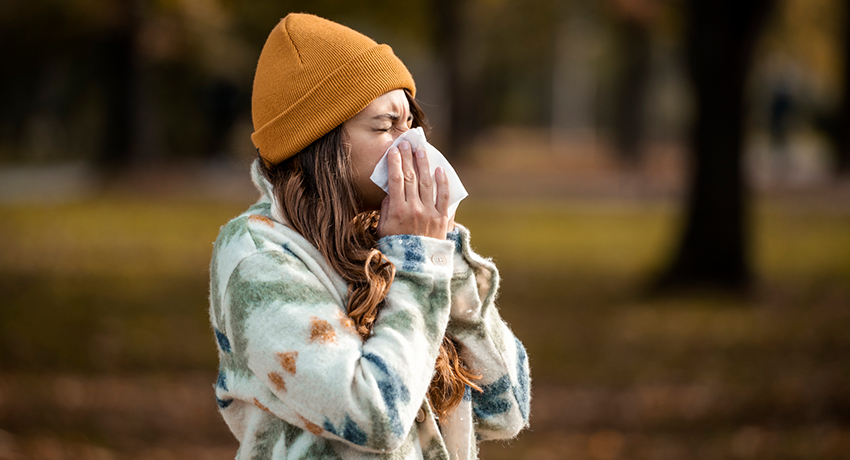Houston is notorious for outdoor allergens so powerful they can stifle your schedule and silence your social life. It’s not just the springtime that brings on the sneezing. Fall has its own set of culprits ready to foil your plans and extend your reach to the nearest tissue box!

“The southern portion of the U.S. has perhaps the highest allergy count in the country,” said William C. Yao, MD, a fellowship-trained rhinologist with UT Physicians.
Ragweed and mold season
Ragweed is the king of fall allergens in Houston, says Yao, associate professor with McGovern Medical School at UTHealth Houston.
“It’s not that ragweed even grows here,” said Yao. “Ragweed is blown in from west Texas because of the wind pattern. It is carried for hundreds of miles and fills our air.”
Ragweed season lasts from mid-September through November, which is also the peak of hurricane season.
The extra hot, humid, and swampy conditions outside breed ragweed’s evil accomplice: mold.
“Mold grows here almost all the time,” said Yao. “But it flares up in the fall with the combination of a humid and stormy environment.”
Fall allergy symptoms
It may be hard to tell the difference between allergies and a virus, but Yao said to pay attention to itchy eyes and a runny nose that come and go for weeks at a time.
“If it’s an allergy, these symptoms will continue for the whole season and fluctuate with local pollen counts,” said Yao.
Minimize Houston fall allergies
Take charge of your fall allergy fears by preparing ahead of time.
Stock up on oral antihistamines that can be purchased at local pharmacies and stores. Regularly check the Houston Health Department website for accurate pollen counts and start taking the medication at the first sign of weed pollen or mold spores in the air.
“Take it every night during allergy season,” said Yao.
He recommends avoiding antihistamines with a ‘D’ component.
“That ‘D’ stands for decongestant, which could raise blood pressure,” explained Yao.
Add a topical steroid like Flonase to your routine, and be sure to use it for at least two weeks for the full benefit.
Before heading outside into maximum exposure, he advises using a topical antihistamine spray.
“When using a nose spray, aim toward your ear,” said Yao. “That’s where the reactive lining is in the nasal cavity.”
Add a nightly nasal rinse to your routine, too, such as a Neti Pot.
“Use half a bottle in each nostril to flush out the pollen,” said Yao. “It’s similar to washing your hands; flushing your nose can help wash out pollen particles.”
Enhanced treatment
For people who can’t seem to catch a break, even with over-the-counter medication, allergy shots or even surgery may be another approach.
“Visit your local allergist or otolaryngologist to determine if this is right for you,” said Yao. “Allergy shots usually take about six months to start working.”
Falling back into routine
Yao says there is a significant impact on reducing outdoor allergy symptoms when using the proper medication consistently.
With the wind blowing in ragweed and the rain breeding mold, fall allergies in Houston are strong but can be reduced so that you can return to the sights and smells of autumn.


